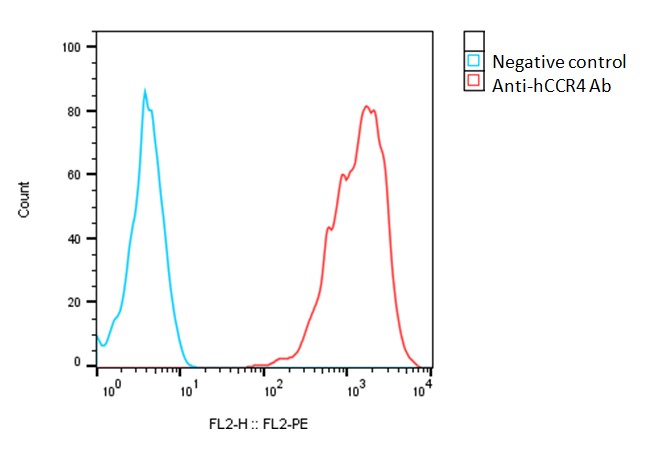
| Catalog Number | Product | Size | Price | |
|---|---|---|---|---|
| C3026 | Human CCR4-CHO-K1 Stable Cell Line | 2 vials | $5950 | Order |
| Catalog Number | C3026 |
|---|---|
| Cell Line Name | Human CCR4-CHO-K1 Stable Cell Line |
| Accession Number | Full length human CCR4 (NM_005508.5) |
| Host Cell | Adherent CHO-K1 |
| Quantity | Two vials of frozen cells (1x106 per vial) |
| Culture Medium | DMEM with 10% FBS, 4 µg/ml puromycin |
| Freezing Medium | 90% FBS and 10% DMSO |
| Storage | Liquid nitrogen upon receipt |
| Product Datasheet: | Download PDF |
Detection of human CCR4 expression on CHO-K1 cells using a PE-anti human CCR4 antibody (BioLegend, Cat #359411)

CCR4, or CC chemokine receptor 4, is a G protein-coupled receptor (GPCR) that plays a crucial role in the immune system by mediating the effects of chemokines and triggering intracellular signaling pathways that influence the behavior of immune cells. The primary function of CCR4 is to regulate the migration of immune cells, particularly T lymphocytes, towards sites of inflammation or infection. This receptor is involved in the homing of T cells to specific tissues and plays a role in immune surveillance. CCR4 is expressed in various tissues, including the skin, lungs, and lymphoid organs. Its expression is particularly notable on certain subsets of T cells, such as regulatory T cells (Tregs) and Th2 cells. CCR4 expression is often found to be dysregulated in certain cancers. For example, it has been reported to be overexpressed in some hematological malignancies, including adult T-cell leukemia/lymphoma (ATLL) and cutaneous T-cell lymphoma (CTCL). The aberrant expression of CCR4 in cancer is associated with increased recruitment of T cells to the tumor microenvironment. Due to its involvement in immune cell trafficking and its dysregulation in certain cancers, CCR4 has emerged as a potential therapeutic target and may help modulate the immune response and inhibit the migration of T cells to the tumor, thereby impacting tumor growth.
Imai T, Baba M, Nishimura M, Kakizaki M, Takagi S, Yoshie O. The T cell-directed CC chemokine TARC is a highly specific biological ligand for CC chemokine receptor 4. J Biol Chem. 272(23):15036-15042. 1997.
Ishida T, Utsunomiya A, Iida S, et al. Clinical significance of CCR4 expression in adult T-cell leukemia/lymphoma: its close association with skin involvement and unfavorable outcome. Clin Cancer Res. 9(10 Pt 1):3625-3634. 2003.
Ferenczi K, Fuhlbrigge RC, Pinkus J, Pinkus GS, Kupper TS. Increased CCR4 expression in cutaneous T cell lymphoma. J Invest Dermatol. 119(6):1405-1410. 2002.